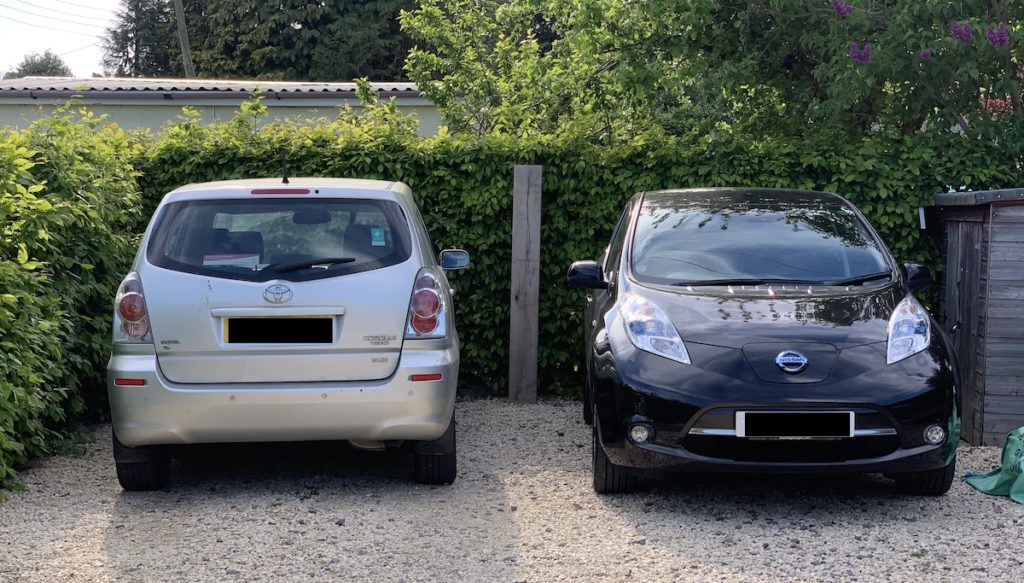Today we took home our first electric car.
We only have one car and honestly we see them as an undesirable necessity. We’re not car people, and we try to be green so we don’t buy into the whole 3-year car replacement cycle (embodied energy cost of car manufacture outweighs the impact of usage over lifetime). I cycle the short distance to our co-working space every day. Our faithful but now worn-out Toyota Corolla Verso is 13 years old, with 200,000 miles on the clock. It served us very well, but we’re going to be selling it soon!

A photo of our old Toyota and our new LEAF.
We held out for so long because we knew we had to get a pure electric car next. We do around 50 miles per day ferrying the kids to and from school, in the hilly Cotswolds. Urban driving this is not.
For longer journeys, depending on how the rapid charging network experience improves, we will just rent a car with longer range if we have to. It is very rare that we do longer journeys by car.
What made an EV possible for us?
For years we were waiting for something with more range, in the vicinity of 200+ miles. We’re not made of money though and it still looks like there’s several years before you can get even a used EV with that kind of range for under £20,000 in the UK.
What I found was that since the 2016 Nissan LEAF upgraded to a larger 30kWh battery, and with the new models coming out in 2018/2019, that there’s a bit of a sweet-spot in the used LEAF market. There are quite a few 2016 models available in the £16000 price range. They seem to offer 80-100 miles in range even after 2-3 years of use and quite a few have low mileage (which is less of an issue for EVs apparently, but inevitably means less wear and tear).
The main requirement is that we can get to see family who are about 65 miles away without having to charge on the way if at all possible — just a charge at the other end before we return. So an 80-100 mile range car should do it. The unknown is the further battery degradation with age. Reports of LEAF battery longevity are actually turning out to be surprisingly good.
In terms of cost, roughly speaking the amount we will save on monthly diesel fuel will cover the loan we’re taking out to pay for it. After that loan is paid off we’re in the money (and as we like to keep our cars until they’re dying, this works out really cheap). On that front, getting a second hand LEAF is a no-brainer. Maybe we’ll want to replace the battery in 3-4 years’ time to keep the range up. We’ll see.
Battery quality anxiety
It is obvious that car dealers are still coming to terms with EVs. They typically don’t know how to give you high quality battery data — the report they gave us is low on detail. Enthusiasts have more detailed tools but I’m not sure how much value there is in it.
As such we have no idea what realistic range we’ll get with this LEAF that is 3 years old and has 25,000 miles on the clock already, as it relies on driving conditions and style. The photo from the dealer showing the dashboard declared range on full charge doesn’t mean much.
Spoiler from our first driving today: it looks like sensible driving can quite easily get 100 miles out of it. We used 7 of the 12 bars and drove over 70 miles on motorway and A-roads, with some light town driving.
Charging infrastructure
There are too many charging cable styles, it’s a mess. The car dealers didn’t even know the details of what connectors were included — they have a 50kW rapid charger on site so they never have to think about this. It turns out rapid 50kW chargers have cables permanently attached.
Making sure all the correct cables were included with the car was thus unnecessarily tedious. With the LEAF they oddly have a Type 1 connector on the car which is meant for slow charging at 3kW, but fast charging at 6kW (which lies in between slow and rapid charging!) requires a Type 2 connector. This means you have to carry a Type 2 to Type 1 adapter cable in the car. These cables cost a lot of money (£100s) if they are missing.
One concern is that while the charging network is improving quite quickly in the UK, you see many reports of broken chargers or problems with charging station apps etc.
Our first charging experience today was from 5 bars with 46mi range to full 12 bars with 110mi range shown in 30 minutes on a CHAdeMO rapid charger in town. No problems at all. It will have cost about £8. It’s not nearly as cheap as using a home charger but absolutely fine when you are travelling and need a fast charge and still about half the cost of our old diesel car for the same mileage.
Home charging point install
This was surprisingly easy to arrange and the UK has a grant system currently so the total cost — including taking cable about 30m down our garden to the driveway is only about £450. We have to wait a couple of weeks to get that installed because the installers need proof of EV ownership before they can book it. Home chargers are typically “fast” chargers with Type 2 connectors and up to 7kW of power delivery, so you charge in a matter of hours.
And so the journey begins…
I’ll post periodically about how this transition is going. My wife has already driven the car and is getting used to the “automatic” driving versus the manual gear-shift we used to have. So far we really like it.